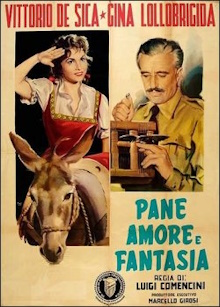I’m not sure I’ll ever watch anything else by director Luigi Comencini but I thought it might be worthwhile to experience at least one of his so-called pink neorealism films. It’s a lighthearted romantic comedy set immediately after the Second World War and stars Gina Lollobrigida, one of the most famous Italian sex symbols. This is another film that will never be considered great but it is an exemplar of the best entertainment available then. Lollobrigida sizzles onscreen from her very first appearance and she even sings excellently. I do note that it shows the male lead as well as many of the other male characters acting very lecherously with no condemnation against them whatsoever. I’d consider that an indictment against Italian culture of the era.
The small town set on a hilltop of Sagliena welcomes Marshal Antonio Carotenuto, the new commander of its Carabinieri station. Though an older man with white hair at the temples, the new Marshall is single and something of a womanizer. As he walks up the hill with his new subordinates, they run into a local young woman everyone calls Pizzicarella la Bersagliera. She is a sultry young woman with a feisty character and is being raised by a poor single mother with numerous other siblings. After settling into town, the Marshal notices that his neighbor opposite is an attractive midwife Annarella. He starts flirting with her but is put off when he learns that she secretly visits Rome once a month. He switches his attention to Bersagliera but she is actually in love with one of his young soldiers Stelluti who is too shy to express himself. When she hears that Stelluti is going to marry another local girl, Paoletta, she starts a fight with her at the market. The Marshal puts Bersagliera in jail for a night to calm her down and tries to use this opportunity to woo her.
This comes pretty close to a sexploitation film as Bersagliera’s first appearance has her in a worn, very tight-fitting dress that is meant to accentuate her breasts. The film plays it off as comedy but this is a menacing moment of sexual tension when the Marshal walks into her jail cell in the middle of the night. Her character is deliberately designed to be both alluring and vulnerable as she is both the most beautiful girl in town and the poorest. The men in town, even the married ones, aggressively makes advances on her and even paw at her, and the implication is that she isn’t safe until she gets married to someone. The film gives her a combative and energetic personality so she’s no damsel in distress, bold enough to even tell off the Marshal. But it’s still at least a little disturbing and indicative of the attitudes of the time. Then again, it’s not that the women behave much better. Bersagliera’s mother all but sells her to the first eligible man to come along and Paoletta is cattish about making sure that she’s the one to bag Stelluti. I never understood why it was the Marshal’s housekeeper who misled Bersagliera about Stelluti’s intentions.
It’s a fairly amusing, entertaining film at least with pretty shots of the town. Even aside from the sexual exploitation, there are plenty of other cultural differences to take note of. For example, the film evinces a certain pride in the Carabinieri but non-Italians will likely be confused at what they actually are. Apparently they are the Italian equivalent of the French gendarmerie, rural law enforcement officers who are under the authority of the Defense Ministry rather than the actual police. I have no idea if the rule about them not being allowed to date or even marry is real but it’s an important plot point here and doesn’t sound too unreasonable. It’s a shame that Annarella is such a minor character whose reason for being is to provide the Marshal with a consolation prize. She doesn’t even have any interaction with Bersagliera. It would have been interesting for her to remark on the younger girl’s situation but I suppose that would have made for a more serious film than its makers wanted.
Playing Bersagliera, Lollobrigida’s superstar quality is immediately obvious and is probably the main reason why this film is still remembered. It’s understandable why films like these were popular in Italy after the war but it’s not anything that will hold up for modern audiences. Still, I don’t regret watching this just to learn about them.
